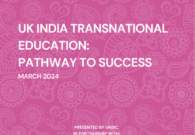Modi’s Visit to the UK: What does it mean for UK-India Relations?
With Modi back in India after his visit to the UK, the UKIBC decided to host a panel discussion, which included Richard Heald, OBE, Group CEO, UKIBC; Rt. Hon Mark Field, MP, Minister of State for Asia and the Pacific, FCO; and Rt. Hon Patricia Hewitt, Adviser to the Board of Trade, to assess the significance of his trip and what it means for the future of the UK-India relationship.

The overall takeaway from the three panellists was that Modi’s visit to the UK was a success, primarily in setting an encouraging tone for the future of UK-India trade and investment and ensuring that this relationship is headed in a positive direction. What was striking was how the bilateral dialogue focused on the future rather than the past and placed technology at the very heart of this partnership going forward.
In this era of digital disruption and economic uncertainty, making the case for deeper connection between our countries is very important.
This was precisely the key topic of the CEO forum meeting which was attended by both PMs. CEOs put forward recommendations to address market access barriers and further strengthen the UK India relationship – discussions centred around technology collaborations, data protection, ease of doing business, visas, arbitration and enforcing the rule of law.
One of the best ideas which emerged at the CEO Forum was around establishing a virtual incubator which would capitalise on the fact that both India and the UK have extraordinary start-up ecosystems and are two of the world’s most innovative economies. Another advantage of this virtual incubator would be to highlight to Indians that Britain is not just a heritage brand but is also the centre of high-tech startups. This initiative will also serve to showcase some of the great projects being undertaken by UK and Indian startups in various sectors and will open up talks on how to maximise their potential to ensure win-win outcomes.
Panellists discussed how to keep the momentum going despite distractions such as India’s general elections and Brexit. It was suggested one of the ways to do is by making sure that the UK’s modern industrial strategy is a lot more focused on certain sectors where India is concerned. These could be the same ones that HMG’s Joint Trade Review is focusing on namely – life sciences, food and drink and IT as well as labour-intensive sectors such as manufacturing, healthcare and tourism which would create jobs for the millions of young people who will be entering the workforce. In addition to sectors, UK government and businesses need to also make efforts to build relationships with various states in India.
Despite UK companies investing heavily and regularly into India over several years, (with the panel highlighting that the 15 UK businesses who attended the CEO forum during Modi’s visit have invested almost £3 billion into India in the last year), there was a general consensus that the vast economic contribution by UK companies was being unfairly underestimated by the Indian government and businesses. This negative perception is compounded by the fact that Indians feel that the UK is investing less now in comparison to other countries, although this is simply because these other countries, unlike the UK, hadn’t traditionally invested in India, and are now investing larger one-off amounts which have been noticed by the Indians. Thus, there is a real need to actively promote the UK’s significant contribution to the Indian economy to get the right message across.
The importance of helping UK SMEs to flourish in the Indian market was also discussed.
Key to the UK government’s efforts in supporting local SMEs would be to rethink the UK’s approach to export credits and finance, as 80% of UK businesses do not trade outside the UK, and by expanding these programmes, SMEs can have the resources they need to take advantage of opportunities overseas, particularly in India.
While it is good to encourage large companies to support smaller companies in entering India through their supply chains, the UK government needs to take more responsibility for helping these SMEs go beyond their comfort zone and equip them with the confidence and capability to trade more with emerging powers like India. The UK government should follow the example set by the Indian government’s Access India Programme (AIP) which has been well received by UK SMEs and Indian businesses alike and is already starting to show results.
The panellists also agreed that from the Indian side, more must be done to bridge India’s infrastructure gap, both through further self-investment, as well as opening up to investment from overseas. This also means doing more to restructure the Indian banking system so that there is more capacity to make loans for infrastructure projects.
In a world where data is rapidly becoming the most valuable commodity, the two countries must explore the idea of a tailored GDPR policy and use it to set standards and do it in a way that’s compatible with the EU – this reform should get priority as we jointly build the UK India relationship of the future and could serve as a blueprint in developing other greenfield regulations for UK and India.







